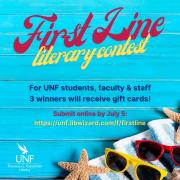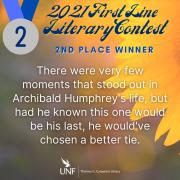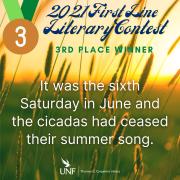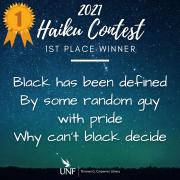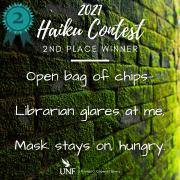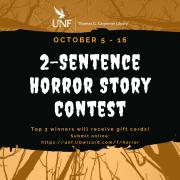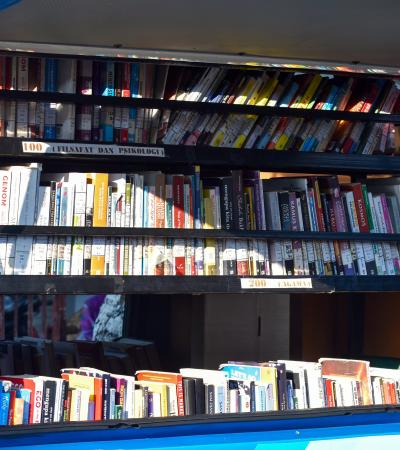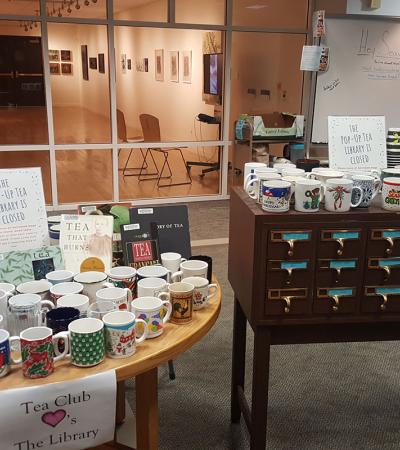UNF's Thomas G. Carpenter Library’s Literary Contests invite students, faculty and staff to virtually participate and share their creativity for a chance to win a prize. Contests include a Haiku Contest in April, a 2-Sentence Horror Story Contest in October, and a First Line Literary Contest in June.
Advanced Planning
UNF’s campus closed in March 2020 due to the COVID-19 pandemic. With the library’s closure came the cancellation of all in-person events and programs planned for the end of spring semester, including numerous finals week activities. In order to reach and engage users, the student outreach librarian proposed the first Literary Contest, a Haiku Contest, to celebrate National Poetry Month in April. Planning began in late March.
The passive program was proposed to library administration, who approved the purchase of three virtual gift cards to use as prize incentives. Contest rules and a submission form were then created in LibWizard, both of which were reviewed by members of the library’s outreach committee.
Planning an entirely online virtual, passive program was challenging, especially with all involved working from home, but once the rules and expectations for participants was put in place, it came together quickly.
Marketing
The first Haiku Contest was promoted virtually via the library’s social media accounts and established university channels, such as the weekly campus newsletter and calendar of events. Future contests were also promoted to instructors in the English department, including those in the creative writing program and writing center unit, who were encouraged to share with their students.
While students were the original targeted audience, faculty and staff were added as secondary audiences in order to widen the field of submissions and get the word out.
In October 2020, the library created a LibGuide to post details about current and previous Literary Contests.
Budgeting
Each Literary Contest has a budget of $45 for three separate gift card prizes of $20, $15 and $10. To cut costs, libraries could offer branded, vendor or sponsored prizes instead of gift cards.
Day-of-event Activity
Each literary contest accepts submissions for approximately two weeks. After the submission window closes, it takes approximately three to four days for volunteers to judge the submissions and rank the top three winners. Ten or twelve volunteers helped judge each literary contest, including a mix of library faculty, staff and student assistants. The only challenge with the judging process is securing volunteers willing to read and rank the multitude of original submissions, which admittedly takes time and effort.
Program Execution
The first Literary Contest received 152 haiku submissions in April 2020, including haikus written by students, faculty and staff across campus. The following three Literary Contests were similarly successful in participation: 2-Sentence Horror Story Contest in October 2020 received 159 submissions, the second Haiku Contest in April 2021 received 75 submissions, and a First Line Literary Contest received 110 submissions.
Feedback was extremely positive from participants and judges, and the 2021 Haiku Contest was covered by our student newspaper and staff newsletter. With so many submissions from across campus and the accolades the library has received as a result, we believe our overall goal to reach our audiences was achieved.
The Library Literary Contests allow for more outreach and an established partnership with the university's English Department and students, but many participants and winners from non-humanities fields enjoyed participating. After the success of the initial Haiku Contest, additional contests were added so that one Literary Contest would take place during each semester in fall, spring and summer.
Although submissions are anonymous, demographic information is collected so that participants can be analyzed. For example, we found that students are more likely to enter, followed by staff, and then faculty.
Advice
Although the Carpenter Library's Literary Contests were built out of COVID-19 programming desperation, these passive programs have become extremely successful. Other libraries interesting in holding a similar activity are encouraged to maintain a web presence (such as a LibGuide or webpage) to display contest rules and information, but to also showcase and celebrate winners and participants. An easily viewable and shareable form (such as LibWizard or Google Forms) is also necessary, especially one that can be modified for future Literary Contests or other passive programs.

